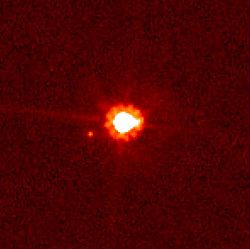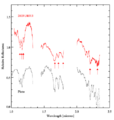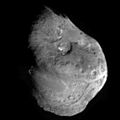Scattered disc facts for kids

The scattered disc is a faraway region in our Solar System. It's home to many small, icy objects called scattered disc objects (SDOs). Think of it as a distant neighborhood beyond the main planets.
This area is partly next to the Kuiper belt, which is another icy region. Even further out, beyond the scattered disc, is the Oort cloud. Scientists first discovered an SDO in 1995. This discovery was made by a project called Spacewatch.
Contents
What is the Scattered Disc?
The scattered disc is a mysterious part of space. It's filled with small, icy worlds. These objects are called SDOs. They are like tiny planets made of ice and rock.
Scientists are still learning about this region. It's one of the most distant places we know in our solar system.
How the Scattered Disc Formed
Astronomers believe the scattered disc formed a long time ago. It happened when objects from the Kuiper belt were "scattered." This scattering was caused by the strong gravity of the giant outer planets. Neptune was especially important in this process.
Imagine a game of billiards. The outer planets acted like cue balls. They knocked the icy objects into new, stretched-out paths.
The Unusual Paths of SDOs
Most objects in our Solar System orbit the Sun in a neat, flat circle. But SDOs are different. They move in very unusual and tilted paths.
- Some SDOs travel very far from the Sun. Their paths are long and stretched out. This is called high orbital eccentricity.
- Other SDOs orbit at strange angles. Their paths are tilted compared to the other planets. This is known as high orbital inclination.
These strange paths make the scattered disc unique. It shows how powerful the gravity of giant planets can be.
Images for kids
See also
 In Spanish: Disco disperso para niños
In Spanish: Disco disperso para niños
 | Stephanie Wilson |
 | Charles Bolden |
 | Ronald McNair |
 | Frederick D. Gregory |




